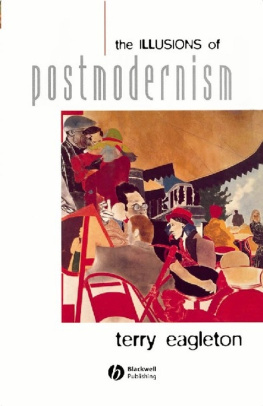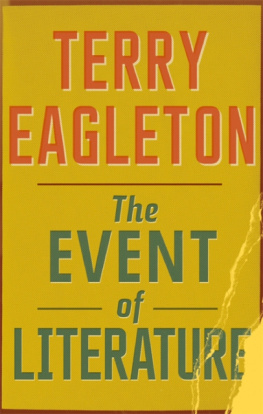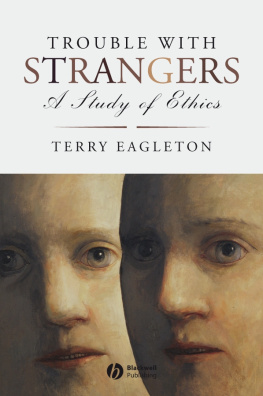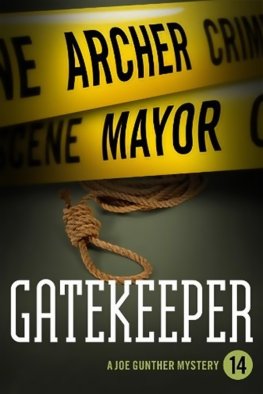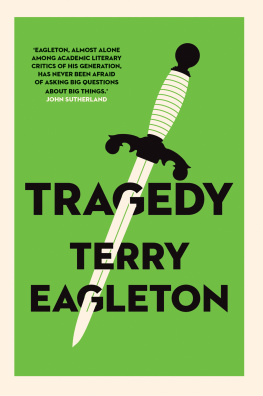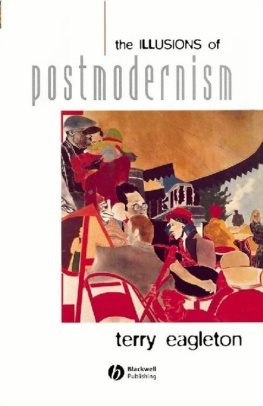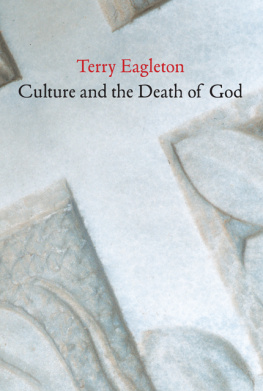Eagleton - The gatekeeper: a memoir
Here you can read online Eagleton - The gatekeeper: a memoir full text of the book (entire story) in english for free. Download pdf and epub, get meaning, cover and reviews about this ebook. City: New York, year: 2002, publisher: St. Martins Press, genre: Detective and thriller. Description of the work, (preface) as well as reviews are available. Best literature library LitArk.com created for fans of good reading and offers a wide selection of genres:
Romance novel
Science fiction
Adventure
Detective
Science
History
Home and family
Prose
Art
Politics
Computer
Non-fiction
Religion
Business
Children
Humor
Choose a favorite category and find really read worthwhile books. Enjoy immersion in the world of imagination, feel the emotions of the characters or learn something new for yourself, make an fascinating discovery.

- Book:The gatekeeper: a memoir
- Author:
- Publisher:St. Martins Press
- Genre:
- Year:2002
- City:New York
- Rating:3 / 5
- Favourites:Add to favourites
- Your mark:
- 60
- 1
- 2
- 3
- 4
- 5
The gatekeeper: a memoir: summary, description and annotation
We offer to read an annotation, description, summary or preface (depends on what the author of the book "The gatekeeper: a memoir" wrote himself). If you haven't found the necessary information about the book — write in the comments, we will try to find it.
The gatekeeper: a memoir — read online for free the complete book (whole text) full work
Below is the text of the book, divided by pages. System saving the place of the last page read, allows you to conveniently read the book "The gatekeeper: a memoir" online for free, without having to search again every time where you left off. Put a bookmark, and you can go to the page where you finished reading at any time.
Font size:
Interval:
Bookmark:
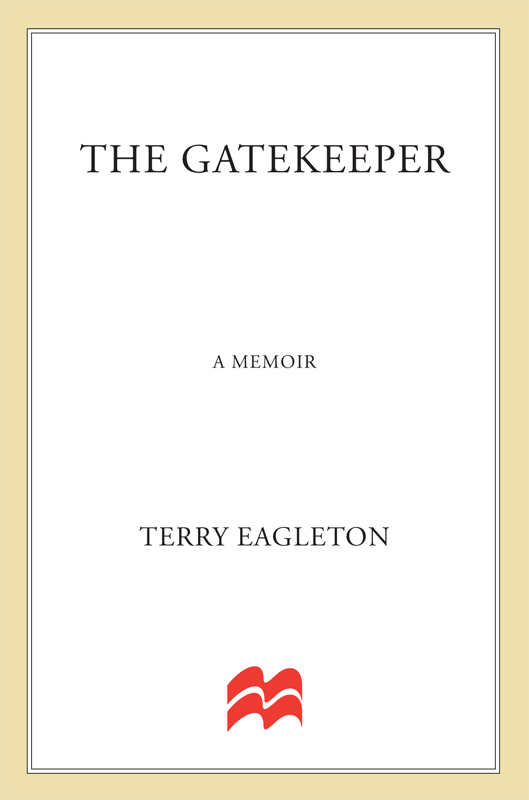

The author and publisher have provided this e-book to you for your personal use only. You may not make this e-book publicly available in any way. Copyright infringement is against the law. If you believe the copy of this e-book you are reading infringes on the authors copyright, please notify the publisher at: us.macmillanusa.com/piracy.
Contents
In memory of Norman Feltes
Lifers
The convent was a squat, ramshackle building, its roof more corrugated iron than Gothic pinnacle. It was set among high walls spiked with shards of glass, forbidding enough to repel voyeurs, religious obsessives, nun-stalkers, sex offenders, militant Protestants, enraged atheists. But the walls were also there to keep the occupants in. For this was a convent of enclosed Carmelite nuns, who once the gate had slammed behind them would see nobody but their fellow nuns and a few priests and altar boys for the rest of their lives.
I was the gatekeeper. As a ten-year-old altar server in the convent chapel, I had to be on hand when a novice, perhaps nineteen or twenty-one years old, took the veil and disappeared into the place for good. She would first be dressed as a bride to symbolize her marriage to Christ, her hair cropped almost to a crew-cut beneath the white lacy veil. In some cases, no doubt, the honeymoon would prove something of a disappointment. Then she would be ushered away by her fellow nuns to return decked in the black veil and rough brown habit of the Carmelite order. I heard later of a young woman who had turned down the Carmelites and opted instead for a religious order which allowed you to wear Marks & Spencer knickers. Though I myself had no personal acquaintance with the knickers of Carmelite nuns, I feel sure that they were forbidding, skin-chafing affairs, slid into place with steel bolts, as the order never missed even the mildest chance for mortification.
The bishop, an old codger from Kildare with the walk of a navvy and the face of a wino, would arrive to officiate at the ceremony. One of us altar boys would be appointed to carry his mitre, the high plush hat he wore on such occasions, while another boy would bear his crosier or symbolic golden staff. We would hold these props through white silken bands draped around our shoulders, the grubby fingers of boyhood being judged too profane. The bishop would require this stuff at various particularly sacred moments in the proceedings, and since these moments were hard to predict we would be on watch for our cue from the master of ceremonies, who had to be deft enough to help the bishop on with his hat without knocking off his skullcap.
We had to look sharp, since at one such clothing a minuscule altar boy, bewildered by the MCs impatient gestures to his temples, threw the last vestiges of secular rationality to the winds and ended up solemnly placing the richly embroidered mitre on his own head, in a surreal parody of the proceedings. The boy with the crosier had the ticklish task of handing the bishop this ornate, outsize version of a shepherds crook while simultaneously going down on one knee and kissing the Episcopal ring. Later in life, describing this piece of acrobatics to some agnostic friends, I realized from their ribald laughter that the phrase going down to kiss the bishops ring had a rather more salacious meaning than had occurred to me at the age of ten.
Once the Te Deum had been sung and the ceremony was ended, the newly clothed sister would be on hand in the convent parlour to say a last goodbye to her family. The parlour, a kind of no mans land or air-lock between the nuns enclosure and the outside world, was a completely bare room bisected from floor to ceiling by a black iron grille. There were closed doors behind the grille on the nuns side, and symbolic spikes jutted ominously from it at the visitor. The nuns side of the parlour connected with the intricate bowels of the convent, while the other side opened through a double door on to the outside world. Both these external doors had to be closed before the door behind the grille could be opened, one of the many arcane rules of the house.
It was my job on these occasions to conduct the young womans parents into the parlour to see their daughter for the last time. They would kneel shyly on the profane side of the grille, partly out of piety and partly because there was nowhere to sit, while their newly-wed daughter knelt smiling on the holy side, her veil thrown back, chaperoned by a kneeling reverend mother whose veil would be lowered. Catholicism seemed to be mainly a matter of kneeling. There was a touch of the zoo about the scene, as though the young creature behind the bars was some exotic, well-nigh extinct species, the reverend mother was her proud keeper and her parents a couple of venerating animal enthusiasts. Then, after a few shambling, perfunctory words had passed between parents and child, the reverend mother would nod discreetly to me, like an officer giving the go-ahead to an execution squad, and I would hold the door of the parlour open for the mother and father to leave, shutting their daughter from their sight for ever as they groped their way sniffling from the room like a couple of blind beggars. Somebody had to do the shit jobs.
For all its drab outer appearance, the convent was Gothic enough in its own way. It was really two separate spaces hinged cunningly together: the sealed interior of the nuns quarters, and then, outside the enclosure, a few public rooms, a small chapel open to local people, and the lay sisters dingy apartments. These two spaces met in a kind of faultline of turntables, concealed doors, secret compartments, small cupboards accessible from both sides, so that the whole building was a sort of trompe lil, like a crazy house at a fairground or an Escher drawing. It was as though the familiar world could open at any moment on to an alternative universe, only inches away from it yet incomparably remote. It seemed a reasonable image of the religious life.
It was also an image of my fissured life as a child. One moment I would be playing tag outside the corner shop, and the next moment I would slip through a black hole into a realm unimaginably remote, where my Protestant friends could not follow and where secular reason slithered to an abrupt halt. The convent was both drab and outlandish, mundane and full of mystery, as the odour of incense mixed with the smell of cabbage water and young women with flat Mancunian accents, whose real names were perhaps Mary OConnor and Agnes Byrne but who were now Sister Teresa Maria of the Holy Cross or Sister Francis Josepha of the Little Flower, slept on wooden planks, rose before dawn to pray and were constantly hungry.
That the place was set on the fringes of Manchester made it seem even more bizarre, as though one were to stumble on a genuine moated castle in the middle of Memphis. There were drawers which slid noiselessly inwards when pulled from behind a wall, turntables which spun spookily without apparent human agency, and the eyes of immured virgins observing you through one-way screens. The drawers and turntables were to be found mostly in the sacristy, another place of passage between inner and outer worlds. Here the priest and altar servers donned their robes for Mass, while the sister sacristan, spectrally concealed on her side of the wall, placed vessels for the Mass in a drawer which would slide suddenly open like something in an inept horror movie. One or two of the more roguish priests would amuse the altar boys by feigning terror when the drawer shot out, pulling imaginary pistols or staging grotesque coronaries.
Font size:
Interval:
Bookmark:
Similar books «The gatekeeper: a memoir»
Look at similar books to The gatekeeper: a memoir. We have selected literature similar in name and meaning in the hope of providing readers with more options to find new, interesting, not yet read works.
Discussion, reviews of the book The gatekeeper: a memoir and just readers' own opinions. Leave your comments, write what you think about the work, its meaning or the main characters. Specify what exactly you liked and what you didn't like, and why you think so.

